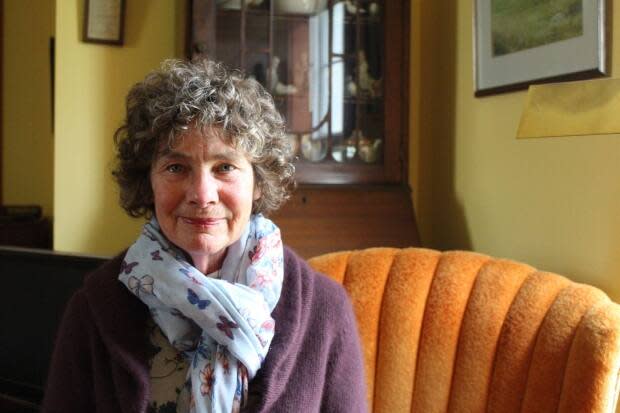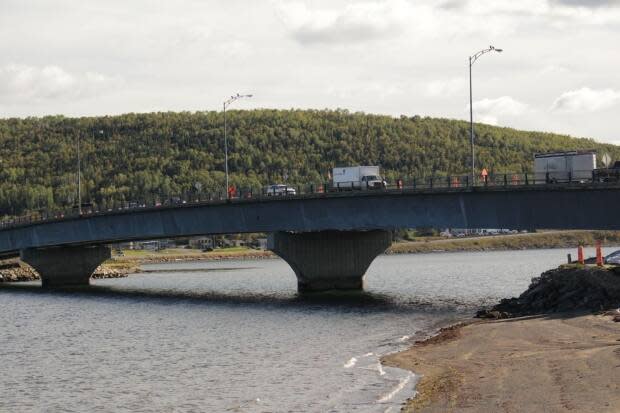Why Gaspé Peninsula's transportation woes leave some voters feeling abandoned

After Yves Galipeau was diagnosed with cancer, he had no choice but to travel to Rimouski for treatment, 440 kilometres away. Every week for seven weeks, he would get in his car in Percé, Que., and make the five-hour drive to the hospital, then back again.
Galipeau says it was far from ideal.
"Renting an apartment, taking leave, being away from my partner for all that time: all those things have an impact on our daily lives," Galipeau said. "It could be different, I think, with more options for travel."
Galipeau, a member of a community group called Solidarité Gaspésie, acknowledges access to specialized health-care services in Quebec's far-flung regions is a whole issue in itself. Still, he said, if he and other patients like him have no choice but to travel to Rimouski, Quebec City or Montreal for care, it would be far better if driving were not the only option.
The very act of sitting in a car for hours on end and focusing on the road is physically draining, said Galipeau. He muses about what a difference a rail service would make.
"It would be easier," he said. "You can work on the train; you can have dinner; you can sleep."

Via Rail suspended passenger service east of Matapédia to Gaspé in August 2013, due to erosion and poor track conditions. People living in the Gaspé Peninsula have been fighting to get it back ever since, but there is still no clear timeline as to when that could happen.
"There have been delays of all kinds," said Carol Saucier, also a member of Solidarité Gaspésie.
Back in 2017, the Couillard Liberal government had promised the return of rail service by 2022. Two years later, the Legault government pushed that date back to 2025.
Last February, the Quebec Transport Ministry announced work on the railway from Caplan to Port-Daniel–Gascons would not be completed until at least 2024, after an engineering report concluded the damage to the track was more extensive than initially thought. That meant the date for rebuilding the rest of the line to Gaspé would also have to be re-evaluated, the ministry said.
Gaspé Mayor Daniel Côté says that's what makes transportation one of the key issues in the provincial election campaign.
"The air transportation is not optimal. The bus transportation with Quebec and Montreal is not really good," said Côté. "According to my view about the situation, I think the railroad will be ready around 2028 or 2030."
And repairing the track is only half the battle, said Saucier.
"Via Rail has always said it would come back when the track is complete, but there is still no real commitment at that level, either," he said.
An aging population
Drinking tea in her home in Barachois, 20 kilometres up the road from Percé, Rev. Cynthia Patterson said she can't help but feel lifelong Gaspésians like her are the victims of both federal and provincial government buck-passing.
"I feel abandoned, really abandoned, by the political parties — by all of them, on this issue," said Patterson. "I've been working on this for 35 years now — since I was a young woman."

Patterson's daughter lives in Montreal, and she tries to visit her as often as she can, but with sciatic nerve issues, she can no longer manage the long drive, so she takes what public transportation is available, in stages.
"I typically take the Kéolis bus to Quebec City," she explained. "I can't sit for more than 12-and-half hours, so I visit friends in Quebec and then I take the bus or the train to Montreal a couple of days later."
In total, the travel time only is more than 15 hours.
"This is a seniors' issue," Patterson said. "As people get older, they may have health problems impeding them from driving."
Even if they are able to drive, she said, the price of gas for someone on a fixed income adds to their hardship.

Claudine Roy, who owns an inn called Auberge sous les arbres, has sat on various boards and committees for 40 years now, and she travels from Gaspé to meetings in Montreal at least twice a week.
She wonders how much longer she can do that.
"Highway 132 is in a pitiful state. When we look at Saint-Anne-des-Monts, it's the festival of orange cones," said Roy. "And coastal erosion is not a myth — it's real. So what would happen if Highway 132 slid into the St. Lawrence? We'd become completely isolated."
Roy said she tries to take the plane from time to time, but that doesn't always work either.
Since Air Canada stopped serving the peninsula two years ago, passengers only have two options — Pascan Aviation and PAL Airlines Both use smaller aircraft that can only seat 50 passengers, at most.
"I'm not blaming the companies that serve us. They're doing their best. But their planes often have mechanical breaks and there's [a shortage of] pilots."
To help alleviate the problem, the Quebec government launched a subsidy program earlier this year which allows people who live in the regions to be reimbursed 30 to 60 per cent of the cost of their airfares, for an unlimited number of tickets.
The program also caps fares at $500 for flights connecting Montreal, Quebec City or St-Hubert to about 20 regional airports, subsidizing the airlines to offset their lost revenue.
However, with such limited space on the flights, Roy does not think that's the solution.
Candidates commit to improvements

Parti Québécois candidate Méganne Perry-Mélançon, the incumbent MNA for the Gaspé riding, said the CAQ's airfare program has been a major disappointment.
"We needed more. We needed more flights per day, better schedules, better services; we need better competition in terms of aviation services," she said.
Perry-Mélançon said her party would do more to improve airline services and make sure the passenger train gets back on the rails.
The Liberal candidate in the riding, Michel Marin, is also promising to bring back the train, and he would like to see a better bus service in the region.
"We want to put short bus routes in place, so that municipalities surrounding larger city centres can gain access to them," said Marin. "We also want to put a program in place for taxis."

As for the CAQ candidate, Stéphane Ste-Croix, he acknowledges the return of the train has faced delays, but he said he would do everything he can to bring it back more quickly.
"The good news is we've got a lot of opportunity," Ste-Croix said. "We've got the train; we've got the marine dynamics with the ports. We've got the flying opportunities. We've put a lot of money into that in recent years."
Québéc Solidaire's candidate, Yv Bonnier-Viger, wants to make it easier for residents to access and charge electric vehicles. He is also pushing to get the train timeline speeded up and would like to see an electric bus service that goes into smaller communities.
"We are trying to augment the offer of collective transportation," he said.
As for the Quebec Conservative Party, Gaspé candidate Pier-Luc Bouchard said the return of passenger rail service is a federal issue, but he would also make air transport more accessible.
"But on the ground we also want to find solutions, whether it be getting taxi service or buses more well-adapted to our population," said Bouchard.

 Yahoo Movies
Yahoo Movies 